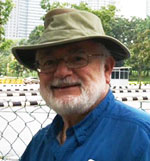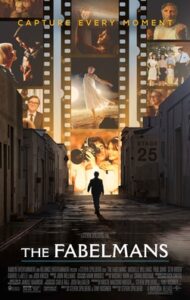By Oliver B. Pollak

TETON VILLAGE, Wyoming — I watched The Fabelmans, Steven Spielberg’s semi-autobiographical film on Amazon Prime. There were four of us in the living room, that cut it down to $5 each. I had no intention of writing about it. I got a birthday gift in November, Paul Newman, The Extraordinary Life of an Ordinary Man, A Memoir (Alfred A. Knopf, 2022) and put off reading it until a flight to our winter break in Jackson Hole. Weird, 10 feet of snow, temperature 15 degrees, but still a respite from Northern California rains. I had no intention of writing about it.
At 30,000 feet between Denver and Jackson Hole, the young lady on my right said, “I see you’re reading about Paul Newman, he’s from Cleveland, and so am I.” I imagine she was a teenager when he died in 2008. I had just reviewed Cleveland Jews and the Making of a Midwestern Community (2020) for Western States Jewish History and spewed out my familiarity with Harvey Pekar and Zubal Books.
My fellow passenger was reading The Book of Lost Names (2020) by Kristin Harmel, a novel about forged documents and evading the Nazi roundup of French Jews. Amazing, I shared the obituary of photographer Adolfo Kaminsky (1925-2023) who had died two days earlier on January 9. His forged documents saved 14,000 Jews from deportation to Nazi concentration camps. My seatmate asked me if I missed teaching, I responded, “I was talking to her.”
Movies tell stories, books tell stories. There were youthful connections between Newman, born in 1925, and Spielberg, born in 1946. When you are trending over 60 your recollections of your parents, courtship tales, marriage, economic circumstances, teachers and students at the schools you attended, your neighborhood, and your first kiss may be in flux.
 It can be awkwardly revealing to talk about the relationship between your parents. It was only when I stood in Federal Court to become an American citizen in 1959 that I found out that my mother was my father’s second wife, he had been previously married. Newman relates how his Jewish father married a Roman Catholic convert to Christian Science because she was pregnant. His father was frustrated in his career, was an alcoholic and died of cancer in 1950 at the age of 56. Paul regarded his father as “highly moral, deeply unhappy” and distant. The Fabelmans reveals Spielberg’s father as a workaholic pioneer computer engineer who relocated the family three times to get to Silicon Valley. His mother divorced Steven’s father for “Uncle Bennie,” his father’s best friend and workmate.
It can be awkwardly revealing to talk about the relationship between your parents. It was only when I stood in Federal Court to become an American citizen in 1959 that I found out that my mother was my father’s second wife, he had been previously married. Newman relates how his Jewish father married a Roman Catholic convert to Christian Science because she was pregnant. His father was frustrated in his career, was an alcoholic and died of cancer in 1950 at the age of 56. Paul regarded his father as “highly moral, deeply unhappy” and distant. The Fabelmans reveals Spielberg’s father as a workaholic pioneer computer engineer who relocated the family three times to get to Silicon Valley. His mother divorced Steven’s father for “Uncle Bennie,” his father’s best friend and workmate.
Both works reveal a frankness about anxiety, doubts, regrets, fears, disappointments, and personal experiences with antisemitism.
Paul Newman enlisted in the Navy when he was 17 and served as an airplane gunner in the Pacific. Newman acted in at least 65 films, two of them about WWII, The Secret War of Harry Frigg (1968) a comedy. Newman played Ari Ben Canaan in the 1960 film Exodus, about transporting Jewish refugees to Palestine in 1947, based on the 1958 novel by Leon Uris.
Spielberg is associated with over 100 films. WWII was his father’s war, and remembering the Holocaust became the film producers mission. They comprise a significant portion of his artistic creation, including Empire of the Sun (1987) about an English schoolboy separated from his parents when Japan invaded China, based on a book of the same name by J. B Ballard, published in 1984; Schindler’s List (1993) published by Thomas Keneally as Schindler’s Ark in 1982, and Saving Private Ryan (1998), by Max Allan Collins, published in 1998. Spielberg has been instrumental in the Shoah Foundation collecting over 53,000 Holocaust testimonies. The Fabelmans includes simulated battles between Nazi and Allied forces casting Boy Scouts as performers.
The Fabelmans is a rich addition to the movies about movies genre that includes Cinema Paradiso (1988) set in Sicily and Inner Circle (1991) about Joseph Stalin’s private projectionist.
Newman’s title page reads like movie credits including researcher, compiler and editor, foreword, and afterword. The indexer is overlooked, but did include “antisemitism, Exodus, Israel, Jewish, Judaism, Judgment at Nuremberg, World War II, Yiddish” as well as the Hollywood gang of writers, actors, producers, and studio executives. And, of course, being a Knopf publication, the last page acknowledges the type of designer, composer, binder, and book designer.
The preparation for Newsman’s book extended from 1986 to 1991 when close friend and screenwriter Stewart Stern started collecting vignettes and testimony from ex-wife of nine years Jackie Witte and wife of 50 years Joanne Woodward, his children, associates, Yale classmates, drinking buddies, and other observers. These episodes are interspersed between Newman’s own memoir recollections. Newman died in 2008, Stern in 2015, the book appeared in 2022.
Deciding to write about The Fabelmans I watched it a second time, another $20. The standards of non-fiction were vitiated by the passing of years and the affection for embellishment and imagination to keep the audience’s attention. Online reviews and descriptions described this coming of age film with comments ranging from “A deeply personal portrait,” “emotionally complex,” “an incredible portrait,” and “based the story partially on his childhood.”
Newman and Spielberg are worthwhile reading and viewing. Finally, about word play and names, spiel is a speech and fable a short story.
*
Oliver B. Pollak, Ph.D., J.D., professor emeritus of history at the University of Nebraska at Omaha, a lawyer, and a member of the Institute of Historical Study, is a correspondent based in Richmond, California. He may be contacted at oliver.pollak@sdjewishworld.com.